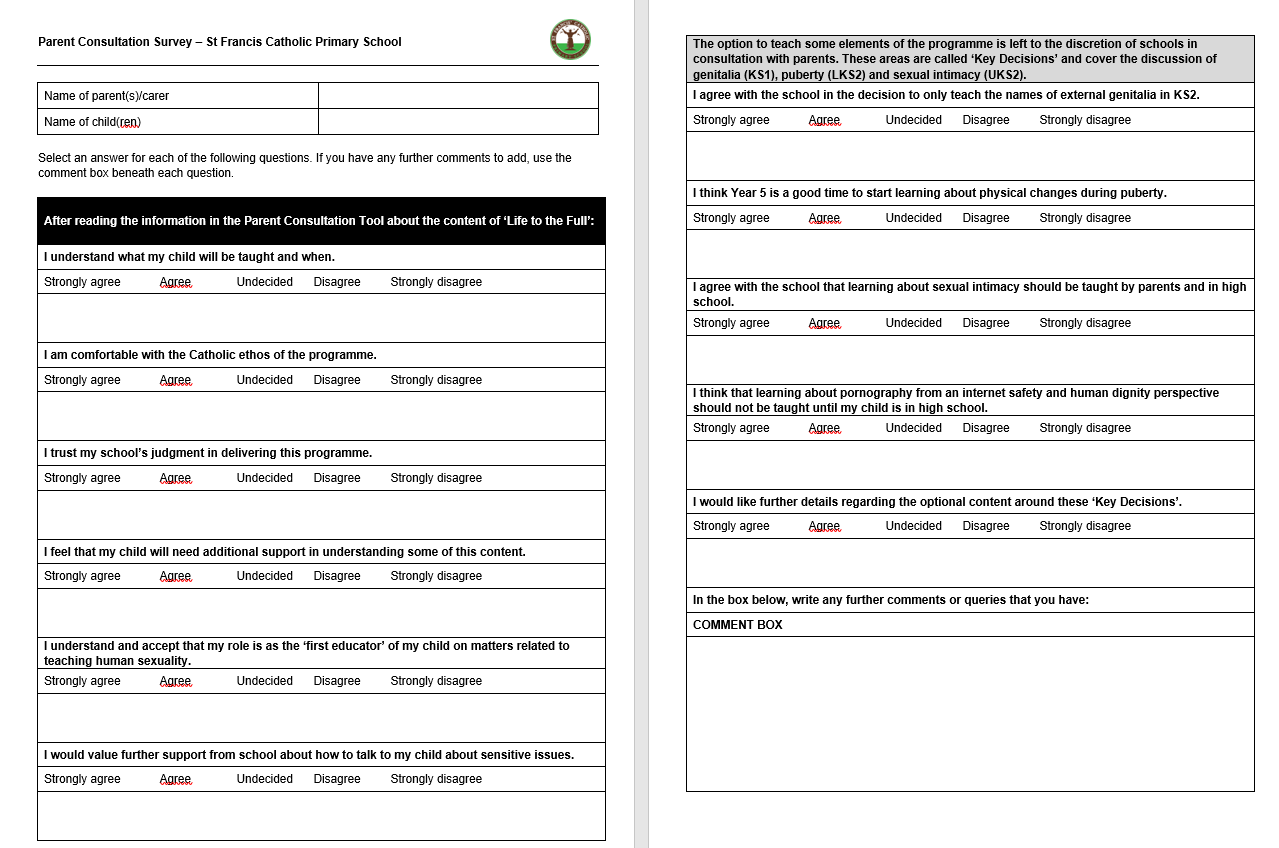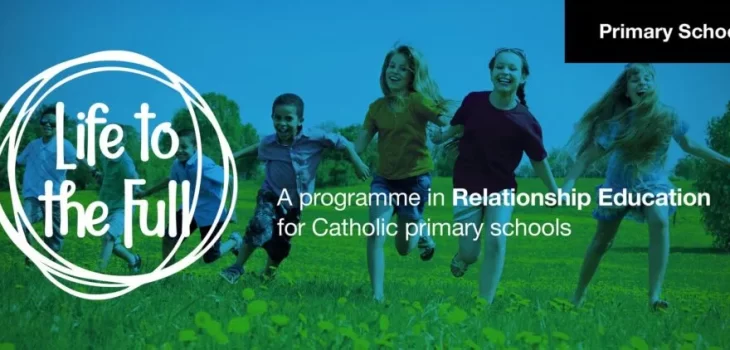‘As children of God, we care for each other and we always try to do our best’
HRSE lead: Mrs J.Rossall
HRSE Governor: Mrs M.Doran
Developing virtues and Values
Gospel virtues and values underpin the HRSE curriculum. The Christian tradition describes behaviours or habits that lead to happiness, human flourishing and a closer relationship with God as virtues. These virtues are described in the Catechism of the Catholic Church and fall into two groups. The theological virtues of faith, hope and love are about developing the habits of being open to the work of the Holy Spirit and developing a deeper relationship with God through living a balanced and happy, good life. The cardinal virtues of practical wisdom (prudence), justice, fortitude and temperance help people develop habits of reason, fairness, emotional resilience and self-mastery. They are human virtues and, as such, are part of the development of people of all faiths or none as they learn how to flourish, thrive and to have a life supported by strong and caring relationships.
Vision for Human Relationships and Sex Education.
At St.Francis’ we are inspired by Jesus to be the very best we can be. We look after one another and show respect and love through our relationships with one another. Jesus is invited into our hearts.
In the Beatitudes, Jesus invites us to lead a full life with him by explaining what makes people blessed or happy. This is about understanding how loving our neighbour enables us to be happy too. Therefore, having a good relationship with ourselves and the other people in our lives makes us grow and flourish and we respect that everyone is a unique and beautiful part of God’s creation. We are all children of God, called to grow in love for him through the person of Jesus Christ and to spread the Good News through the action of the Holy Spirit.
HRSE is part of the mission of Catholic schools to educate the whole person. It should be carried out as part of the holistic education which seeks to form as well as inform young people in preparation for adult life.
Equalities obligations
The governing body have wider responsibilities under the Equalities Act 2010 and will ensure that our school strives to do the best for all of the pupils, irrespective of disability, educational needs, race, nationality, ethnic or national origin, pregnancy, maternity, sex, gender identity, religion or sexual orientation or whether they are looked-after children.
Intent
As a primary school in the Diocese of Lancaster Education Service, we use the term Relationship, Sex and Health Education as it believes that relationships education is about all aspects of growing a fulfilled and happy life, sexual education is a dimension of this greater whole. For example, The defining belief of Christianity is that God took on human form. This endows the human form with an extraordinary dignity that goes beyond that of all other forms of life and shows that humanity alone can embrace this relationship with God.
Education about human love is no less a part of a Catholic schools responsibility than teaching about mathematics or English. At St.Francis’ we teach young people about how to form relationships, including understanding loving relationships and acknowledging that children’s first experience of love is in the home. We encourage children from the earliest age to recognise that they are all children of God and that each person shares a God given dignity. As children mature, we encourage them to follow the example of Jesus and live lives inspired by the Gospel virtues, enabling them to follow His commandment to “Love your neighbour as yourself” (Mark 12:31). This is the basis for all relationships in our school.
Teaching about relationships in our schools is supported by Christian virtue teaching as outlined in the Catechism of the Catholic Church and in line with
‘Fit for Mission? Schools’. The Department for Education (2021) suggests that sex and relationship education should build on the children’s own experiences, be sensitive to the specific domestic contexts the children come from, form attitudes and values towards relationships, develop personal and social skills and increase the knowledge and understanding of each young person as they grow about their relationships and well-being, including sexual health. The Diocese of Lancaster supports all these aims in educating about relationships and sex education though recognises that the Church’s objectives in this are about complete human formation. We are not required to teach sex education in Primary School and we do not teach this in our curriculum.
Implementation
“We must wonder! We must create an environment of wonder! We must create a climate of wonder! This task is closest to the family…Wonder is needed so that beauty might enter into human life, into society and the nation…We need to marvel at everything that is found in man.” Pope St. John Paul II
Across our whole school, we use Ten: Ten Life to the Full resources to support our HRSE lessons.
Our ‘Living, feeling, dreaming’ curriculum informs pupils and invites them to consider ethical and moral issues with most children developing well in their attitudes. Our ‘Ethical & World Thinking’ strand of each topic allows the children to delve into a different issue each half term that they can debate, discuss and put big dreams into action. Examples include plastic pollution in our oceans, challenging stereotypes in careers and equality in our world. The Ten Ten resources for Primary schools are based on Relationships and Health Education.
Recognising themselves as valued citizens and voices of their generation, they come up with ways to make small changes such as writing to our MP and local businesses, litter-picking, planting trees and campaigning for change in school and in our community. They learn about the importance of truth, justice and fairness and their understanding is demonstrated in the ways in which they are prepared to stand up and speak out when they believe that something is wrong. Our effective School Council, Eco Council and CAFOD Club listen to ideas and discuss ways to action change. Members of the councils support the direction of the school, considering pupil voice.
The programme of study will be taught through cross curricular dimensions where appropriate, such as R.E, science and computing. Sometimes, the children’s learning will be best supported by using other agencies, such as the school nurse, or other visitors to school. Such visitors will be guided to read the protocol for visitors at St. Francis’ and agree to follow its instruction. Sensitive subjects in HRSE always need to be framed so that the young people who are participating know that there is pastoral support if any of the issues discussed make them feel the need to talk further or share confidential information. This should always be done within the safeguarding framework of the school. All staff teaching HRSE have up to date safeguarding professional development. Questions asked by students that are a cause for concern for the teacher will be addressed in accordance with the school’s safeguarding policy and confidentiality procedures.
Updated Parent Consultation following the introduction of our new scheme-Life to the Full
In June 2023, school opened another parental consultation process for RSHE as a wish for us to constantly be mindful of changing needs to our community and to engage with new parents and refresh existing parents. Please click on the link below to read the Parent Consultation letter which gives details on how to take part in this important process. You are very welcome and encouraged to fill this in and send it via Seesaw at any time. We value your opinions and thoughts on such an important aspect of your child’s development.

In order for Catholic HRSE to be fully effective it needs to:
- Be faithful to the Church’s vision of human wholeness whilst recognising the contemporary context in which we live today;
- Involve parents as they are primary educators of their child;
- Provide a positive view of human sexuality and dignity of the human person;
- Equip young people with the ability to make practical judgments about the right thing to do in particular circumstances;
- Explore and promote virtues which are essential to promoting respect and dignity;
- Be delivered in an age appropriate way which reflects the development of the child;
- Be part of the cross-curricular work in both primary and secondary schools;
- Be sensitive to the needs of the individual pupil and recognise the mix of pupils with different sexual orientations, genders and family backgrounds in each class;
- Be taken seriously by governors and teachers as an integrated part of the broad and balanced curriculum that Catholic schools offer;
- Be delivered by competent professionals who understand the Church’s teaching.
Catholic Education Service
The following information is taken from: www.catholiceducation.org.uk
Please click on the links below to access useful guidance and resources from the Catholic Education Service.
DfE Guidance and Resources
Click to access Relationships_Education_RSE_and_Health_Education.pdf
TenTen Resources – Life to the Full
We use an child friendly and appropriate scheme of work called Ten Ten Life to the Full
Please click on the link below to see the whole school overview-this is what your child will learn and when:
Online Parent Portal
As part of Life to the Full resources, there is an Online Parent Portal. This area of the Li e to the Full website is available to all parents whose schools subscribe to Life to the Full or Life to the Full Plus. The Online Parent Portal provides a summary of each session, links to specific content, and suggestions for further engagement at home. For Collective Worship, parents can access the monthly newsletter with suggestions for prayer times at home, plus seasonal resources to enhance faith engagement at home.
Every school is given a unique username and password which they can distribute to parents to provide all-year-round access to the portal – though please note that this information should not be shared in public forums (e.g. the school website), which would make your school’s personal login details available to a wider audience than the parents of the children in your school. We have sent you all your password for you to gain access to this area-please contact your class teacher if you are struggling to get on the website.
The statutory framework replaces Statutory Guidance: ‘Sex and Relationships Education Guidance’ (2000). The DfE states that it intends to update the guidance every three years
The statutory guidance is available from the DfE (https://www.gov.uk/government/publications/ relationships-education-relationships-and-sex-education-rse-and-health-education). It should be read in conjunction with this Diocesan guidance and the following documents.
- Keeping Children Safe in Education (statutory guidance)
- Respectful School Communities: Self Review and Signposting Tool (a tool to support a whole school approach that promotes respect and discipline)
- Behaviour and Discipline in Schools (advice for schools, including advice for appropriate behaviour between pupils)
- Equality Act 2010 and schools
- SEND code of practice: 0 to 25 years (statutory guidance)
- Alternative Provision (statutory guidance)
- Mental Health and Behaviour in Schools (advice for schools)
- Preventing and Tackling Bullying (advice for schools, including advice on cyberbullying)
- Sexual violence and sexual harassment between children in schools (advice for schools)
- The Equality and Human Rights Commission Advice and Guidance (provides advice on avoiding discrimination in a variety of educational contexts)
- Promoting Fundamental British Values as part of SMSC in schools (guidance for maintained schools on promoting basic important British values as part of pupils’ spiritual, moral, social and cultural (SMSC)
- SMSC requirements for independent schools (guidance for independent schools on how they should support pupils’ spiritual, moral, social and cultural development).
- National Citizen Service guidance for schools
